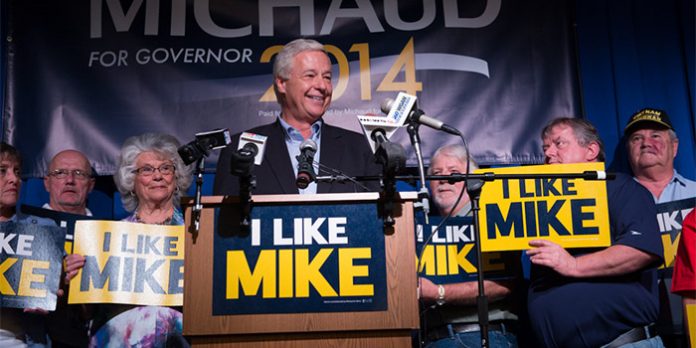If Mike Michaud hangs on to his lead in the polls, he could become the nation’s first openly gay person to be elected to a governorship, making him arguably the most powerful out politician in the U.S.
Will Maine be the first state in the nation to elect an openly gay governor? It certainly could be if Congressman Mike Michaud (D-Maine) holds his (slim) lead in very early polls against other declared candidates, sitting Republican Governor Paul LePage and Independent businessman Eliot Cutler.
Michaud, 58, who announced his bid for the Blaine House last summer, put rumors to rest in November when he announced that he is gay in an op-ed that ran in Maine’s largest newspapers. Few people were shocked, something Michaud as much as predicted in his announcement.
“ … I wasn’t surprised to learn about the whisper campaigns, insinuations and push-polls some of the people opposed to my candidacy have been using to raise questions about my personal life. They want people to question whether I am gay,” he wrote. “Allow me to save them the trouble with a simple, honest answer: ‘Yes I am. But why should it matter?’”
The outcome was anything but dramatic. Just as states that legalize gay marriage no longer grab above-the-fold headlines, Michaud’s statement did little more than make him the eighth openly gay member of Congress and confirm what many people already seemed to know. There was little awe, even from the voters in his district, which rates as the largest east of the Mississippi, and one of the more conservative in New England.
“For me, it’s just a part of who I am, as much as being a third-generation mill worker or a lifelong Mainer,” Michaud wrote. “One thing I do know is that it has nothing to do with my ability to lead the state of Maine.”
Mainers agreed en masse. Polls immediately following Michaud’s op-ed showed no statistical shift in his support, and the media was hard pressed to find anyone who would turn against Michaud, even among those who have a bone to pick with homosexuals. In the Bangor Daily News article—“Spectrum of reactions to Michaud coming out: shock, surprise, ‘we all knew it’”—published a couple days after the oped, a comment from a 70-year-old retiree from a Millinocket paper mill may have been the most telling.
Dick Waceken said that “Michaud’s homosexuality, while known—‘if somebody’s gay, it gets around fast’—never mattered much.”
“We all knew Mike was gay,” Waceken told the Bangor Daily. “They still voted for him because he is from the area. And he’s an honest man. I think I am anti-gay. I think women should be with men and men should be with women, but I am still going to vote for Mike.”
For voters in his district, Michaud commands respect: like his father, and his grandfather before him, Michaud was a mill worker in northern Maine for 30 years before his election to Congress in 2002. During that time, he was elected seven times to the Maine Legislature, adjusting his shifts at the mill to accommodate an erratic schedule in Augusta.
In Congress, Michaud was staunchly pro-LGBT out of the gate, even going on record as opposed to previous versions of ENDA because it didn’t go far enough on trans inclusion.
With plenty of time for the political winds to shift in a state where a majority of voters identify as Independent, the gubernatorial race is just now starting to take form. All indicators suggest that it will be close and contentious: LePage maintains support from his own party despite a series of high profile gaffes, while Cutler appeals to Independent and Democratic voters who point to his fiscal experience in the private sector as enticing.
Now, with the gay question behind him and no loss of momentum, he tells Boston Spirit that he’s looking forward to the race, that he enjoys being a role model for those seeking to “come out,” and that, when he needs to blow off a little steam, pulling out the chainsaw and doing some backwoods work is the best stress-reliever.
[SPIRIT] For many people, uttering those words “I’m gay” publicly can be emancipating: how did you feel when, suddenly, it was no longer a secret?
[MICHAUD] Actually, people have been very supportive, After I came out and it made the news, support from family, friends and colleagues—from around the country and even some people from overseas who were originally from Maine—has been overwhelming. As I told one reporter, I’m the same Mike that I was last month or last year. I haven’t changed, but what has changed is that several people have come to me since I came out and they have told me that I provided them with the impetus to come out.
[BS] That must be a good feeling.
[MM] Yes, it is. And I was surprised how many people actually did that that first week. It was heartwarming. I’d say that if my coming out makes it easier for others to come out, then it’s really great.
[BS] Was there a “phew!” moment?
[MM] It really hasn’t been a focus in my life. I’m pretty busy. I guess it’s a relief, but I honestly haven’t had a lot of time to sit back and think about it. I will say I had a busy week scheduled, so when the op-ed appeared on that Monday, well, that was the day I had marked off to go grab my chainsaw and work in the woods. I didn’t get much time to do that with all the calls I had to take.
“I think I am anti-gay. I think women should be with men and men should be with women, but I am still going to vote for Mike.”—Dick Waceken, Maine voter
[BS] So, for you, it was “OK, I said it and now I want to go cut down trees!”
[MM] Well, I think it highlights the fact that I really wanted to be in Maine when I made the announcement so the press had access to me, number one. And even though it was a difficult decision to make, I’m not ashamed of it, so we’re moving forward.
[BS] As a Congressman, you’ve supported the LGBT community on a whole range of issues for years. In fact, you came out in opposition to ENDA (the Employee Non-Discrimination Act) because it didn’t go far enough to support transgender people. What’s been the most exhilarating win for you?
[MM] [The repeal of] Don’t Ask, Don’t Tell. I’ve been serving on the Veteran’s Affairs Committee since I started in Congress, and I’ve talked to a lot of soldiers and a lot of veterans who have told me their stories. So, it’s probably been the most rewarding issue for me to work on. There are a lot of Americans who wanted to serve on the front lines, and they couldn’t do that and be openly gay, so I was very pleased to see that go through. But I’m also proud of the work that’s been done in Maine. It was the first state to pass gay marriage by referendum. And I was very honored to come back and work on that issue. Even though I represent the more conservative of the two Maine Congressional districts, I never backed away from that issue. I remember there was some controversy because a lot of members of the legislature in Maine thought bringing the issue back could hurt them. I was among those who said, “If not now, when?” And, everything turned out fine.
[BS] What do you think will be your greatest challenge in a three way gubernatorial race?
[MM] Well, the other two candidates were both on the ballot last time, and I’m the new kid on the block. [For that reason] I’m feeling really good because I have a lot of experience working in the legislature, I know the state budget, I know how to work across the aisle, I know how to bring resources to Maine so the state can grow and prosper. It’s great to have a lot of good ideas, but if you can’t work with anyone, you can’t get anything done. I think I’m the only candidate who has that proven track record.
[BS] What is your vision for the state?
[MM] My vision is to foster a positive outlook for the people of Maine, and the people who love it here, to get Maine back on the right track.
[BS] What word comes to mind when you consider the fact that you could become the first openly gay person elected governor in the U.S.?
[MM] Well, it’s humbling to think I might be the first gay governor to be elected in the country, but I think it’s very reflective of how far we’ve come. [x]









